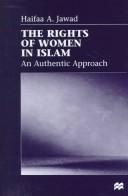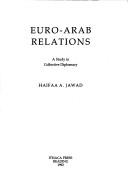| Listing 1 - 10 of 10 |
Sort by
|
Book
ISBN: 9780826496843 0826496849 9781472506344 1472506340 Year: 2013 Publisher: London: Bloomsbury academic,
Abstract | Keywords | Export | Availability | Bookmark
 Loading...
Loading...Choose an application
- Reference Manager
- EndNote
- RefWorks (Direct export to RefWorks)
Muslim converts --- Conversion --- Muslims --- Islam
Book
ISBN: 1626379467 1626376581 9781626376588 9781588269256 1588269256 9781626379256 Year: 2013 Publisher: Boulder: Lynne Rienner,
Abstract | Keywords | Export | Availability | Bookmark
 Loading...
Loading...Choose an application
- Reference Manager
- EndNote
- RefWorks (Direct export to RefWorks)
How are women in the Arab world negotiating the male-dominated character of Islamist movements? Is their participation in the Islamic political project--including violent resistance against foreign invasion and occupation--the result of coercion, or of choice? Questioning assumptions about female powerlessness in Muslim societies, Maria Holt and Haifaa Jawad explore the resistance struggles taking place in Lebanon, Iraq, Palestine, and elsewhere in the Middle East from the perspectives of the women involved. The authors make extensive use of vivid personal testimonies as they examine the influence of such factors as religion, patriarchy, and traditional practices in determining women’s modes of participation in conflicts. In the process, they add to our knowledge not only of how women are affected by political violence, but also of how their involvement is beginning to change the rules that govern their societies.
Women --- Women and religion --- Women and war --- Political participation --- Arab Spring, 2010 --- -Arab Awakening, 2010 --- -Citizen participation --- Community action --- Community involvement --- Community participation --- Involvement, Community --- Mass political behavior --- Participation, Citizen --- Participation, Community --- Participation, Political --- Political activity --- Political behavior --- Political rights --- Social participation --- Political activists --- Politics, Practical --- War and women --- War --- Women and the military --- Religion and women --- Women in religion --- Religion --- Sexism in religion --- Social conditions. --- Disability studies. --- Disabilities --- Sociology of disability. --- People with disabilities. --- Cripples --- Disabled --- Disabled people --- Disabled persons --- Handicapped --- Handicapped people --- Individuals with disabilities --- People with physical disabilities --- Persons with disabilities --- Physically challenged people --- Physically disabled people --- Physically handicapped --- Persons --- Sociology of disability --- Sociology of disablement --- Sociology of impairment --- People with disabilities --- Disability --- Disabling conditions --- Handicaps --- Impairment --- Physical disabilities --- Physical handicaps --- Diseases --- Wounds and injuries --- Animals with disabilities --- Education --- Social aspects. --- Sociological aspects --- Study and teaching --- Curricula --- Women and relistion --- -Social conditions. --- -Social conditions --- Women - Arab countries - Social conditions --- Women and religion - Arab countries --- Women and war - Arab countries --- Political participation - Arab countries - 21st century --- -Women --- Arab Spring, 2010-

ISBN: 0333650867 Year: 1998 Publisher: Basingstoke London Macmillan Press
Abstract | Keywords | Export | Availability | Bookmark
 Loading...
Loading...Choose an application
- Reference Manager
- EndNote
- RefWorks (Direct export to RefWorks)
Digital
ISBN: 9781626376588 Year: 2022 Publisher: Boulder Lynne Rienner Publishers
Abstract | Keywords | Export | Availability | Bookmark
 Loading...
Loading...Choose an application
- Reference Manager
- EndNote
- RefWorks (Direct export to RefWorks)
Book
Abstract | Keywords | Export | Availability | Bookmark
 Loading...
Loading...Choose an application
- Reference Manager
- EndNote
- RefWorks (Direct export to RefWorks)
Developmental psychology --- Islam --- Sociology of culture --- Sociology of minorities --- Sociology of the family. Sociology of sexuality --- Sociology of occupations --- Community organization --- Social policy --- Teaching --- Recreation. Games. Sports. Corp. expression --- Equal opportunities --- Gender --- Migration background --- Multiculturalism --- International --- Girls --- Education --- Participation --- Sport --- Sports professions --- Book
Book
ISBN: 9780203880630 9780415490764 Year: 2010 Publisher: London Routledge
Abstract | Keywords | Export | Availability | Bookmark
 Loading...
Loading...Choose an application
- Reference Manager
- EndNote
- RefWorks (Direct export to RefWorks)
Muslim athletes --- Sports for women --- Women athletes --- Women

ISBN: 086372129X Year: 1992 Publisher: Reading (Mass.) : Ithaca press,
Abstract | Keywords | Export | Availability | Bookmark
 Loading...
Loading...Choose an application
- Reference Manager
- EndNote
- RefWorks (Direct export to RefWorks)
Arab countries --- Relations --- Europe
Book

ISBN: 9780292795778 Year: 2021 Publisher: Austin
Abstract | Keywords | Export | Availability | Bookmark
 Loading...
Loading...Choose an application
- Reference Manager
- EndNote
- RefWorks (Direct export to RefWorks)
Digital

ISBN: 9780292795778 Year: 2021 Publisher: Austin, Tex. University of Texas Press
Abstract | Keywords | Export | Availability | Bookmark
 Loading...
Loading...Choose an application
- Reference Manager
- EndNote
- RefWorks (Direct export to RefWorks)
Digital

ISBN: 9781477317495 Year: 2021 Publisher: Austin, Tex. University of Texas Press
Abstract | Keywords | Export | Availability | Bookmark
 Loading...
Loading...Choose an application
- Reference Manager
- EndNote
- RefWorks (Direct export to RefWorks)
| Listing 1 - 10 of 10 |
Sort by
|

 Search
Search Feedback
Feedback About UniCat
About UniCat  Help
Help News
News